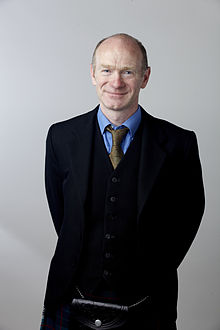Peter Keightley
Peter Keightley | |
|---|---|
 Peter Keightley at the Royal Society admissions day in London, July 2014 | |
| Born | Peter D. Keightley |
| Alma mater | University of Edinburgh (PhD) |
| Awards | FRS (2014)[1] |
| Scientific career | |
| Fields | |
| Institutions | William G. Hill, also influenced by Henrik Kacser |
| Website | www |
Peter D. Keightley
Evolutionary Biology in School of Biological Sciences at the University of Edinburgh.[2]
Education
Keightley was educated at the
William G. Hill.[3] During his doctoral work he collaborated with Henrik Kacser on a highly cited paper on genetic dominance.[4]
Research
Keightley leads a laboratory which works on evolutionary genetics and the evolutionary impact of new mutations on molecular genetic and quantitative trait variation and fitness. His research investigates genetic variation and adaptation through the analysis of nucleotide variation within natural populations and between different species.[5][6][7][8][9][10][11][12]
Keightley's research has been funded by the Biotechnology and Biological Sciences Research Council (BBSRC).[13]
Awards and honours
Keightley was elected a Fellow of the
DNA sequences, in an unusually productive and innovative way. His work has shed light on several fundamental questions in genetics and evolution. He is especially well known for his work on the effects on fitness and rate of occurrence of spontaneous mutations. This has led to a much improved estimate of the deleterious mutation rate for the genome as a whole.[1]
References
- ^ a b c Anon (2014). "Professor Peter Keightley FRS". royalsociety.org. London: Royal Society.
- ^ Peter Keightley publications indexed by the Scopus bibliographic database. (subscription required)
- ^ hdl:1842/12340.

- PMID 3666444.
- PMID 17994087.)
{{cite journal}}: CS1 maint: numeric names: authors list (link - S2CID 8934412.
- S2CID 10868777.
- S2CID 4314159.
- S2CID 40023026.
- S2CID 4406612.
- PMID 7896110.
- S2CID 4422532.
- ^ UK Government research grants awarded to Peter Keightley Archived 27 July 2014 at the Wayback Machine, via Research Councils UK
